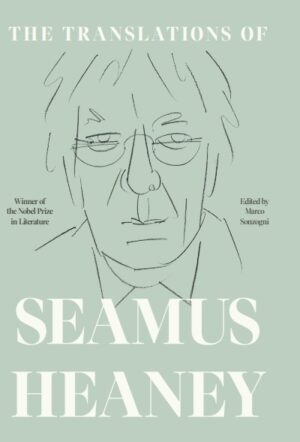The Translations of Seamus Heaney
by Seamus Heaney, edited by Marco Sonzogni
Reviewed by Gabrielle McClellan
The Translations of Seamus Heaney is a coffee table book for bibliophiles. This collection of over a hundred translations by the Nobel Prize-winning poet opens with Horace’s “To a Wine Jar,” a sardonic ode to the “sugared poison of souls,” before turning to Baudelaire’s “The Digging Skeletons.” A poem poking at the sins of alcohol alongside a healthy dose of memento mori might seem jarring at first, but the pleasure of the collection lies in discovering new poets buried among the giants.
The more than fourteen languages in this 700-hundred-page volume span Irish, Old English, French, German, Italian, Greek, Romanian, and Czech. Heaney most famously translated the Old English epic Beowulf and is fluent enough to translate from a number of other languages, including Latin, Ancient Greek, and Old Irish. But it is not immediately obvious which poems he translated from the original and which he retranslated from other English translations. The editor provides a translation history for each poem at the end of volume, but I would have liked the year of publication and original language with each poem on the page.
Many of the most familiar classics are here, including Beowulf, Ovid’s Metamorphoses, and the first few cantos of Dante’s Inferno. But it is the lesser-known poets—the ones you likely did not read in a high school literature course, or college for that matter—that become the backbone of The Translations. Several of these poets, including a selection of Romanians, Irish, and Italians, write about dark themes without overwhelming the reader. They share a fascination with the body and its gross proclivities, like aging and crying. Marin Sorescu, born in 1936 in Bucharest, offers a startling address to an aging “you” in “Old people in the shade”:
One of your nails has turned septic
One of your teeth seems to be looser
Sorescu finishes by declaring that “even the foetus in its mother’s womb” is old.
Embodiment in many of these poems is pushed to such an extreme that it verges on satire; pained laughter is the only logical relief. The poems of Romanian poet Ana Blandiana, born in 1942, similarly sting, as she muses about her own body:
Sometimes I dream of my body
Caught in a trawl-net of wrinkles
And pulled like a dead weight through snow;
Blandiana and Sorescu, like Heaney in much of his own poetry, pay special attention to the grotesque. And many of the poets who write about the body in this behemoth collection seem to move between the outrageous and the tongue-in-cheek. But this is also true of other poets who focus their attention and nature and the richness of flora and fauna in a nostalgic and beautiful way. Some of these poems are serious, even tragic.
Nineteenth-century Italian poet Giovanni Pascoli appears both in the beginning and end of The Translations, and his acute yet subtle observations of the natural world tie the volume together. In Pascoli’s “The Fallen Oak,” remnants of a dead oak become the symbol of man’s destruction of nature: “Everyone’s happy” chopping away at the tree for a “bundle of sticks” to take home, leaving a bird to cry over “something she won’t find: her nest.” In his poem “The Foxglove,” two former nuns share memories of their former life in the convent, recalling the “blackberries that ripened on the bramble” in their garden and “junipers where the thrushes sang,” before veering to the “flower … of death,” which
… oozed a kind of honey
Drugging the garden air, a drifting poison
That left the soul oblivious and drowsy.
Pascoli bookends the volume, but the body of the collection is the epic poem, with Ovid’s Metamorphoses, texts by Sophocles, and Beowulf nestled back-to-back. Sweeney Astray, an Irish epic, which Heaney recasts from an earlier translation by J. G. O’Keefe and which earned him the 1983 PEN Award Translation Prize, stands out among many familiar works. Heaney spent over a decade translating this tale of an Irish king who, enraged by a priest who builds a church on his land, attacks the cleric, who curses him in revenge.
Nearing the end of the volume, Pascoli’s final poem, “The Last Walk,” features a narrator who remarks on “jubilating roosters” and “fireworks sputtering in the air” as he strolls through the countryside, passing children playing and washerwomen working and cattle grazing. In the final stanza, the narrator is back home and draws near the hearth, where he can “return to versing” after his long day. The poem invites us to follow suit as we end our own long walk through Heaney’s translations: sit back, relax, and enjoy the poems.
Published on December 10, 2023

